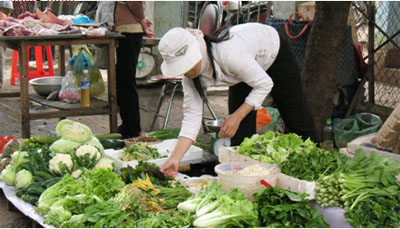Rising food prices may lead to CPI increase
If prompt measures are not taken to control food prices, the increase of the Consumer Price Index (CPI) is likely to surpass 1 percent.
The CPI slow down in June was a sign for Vietnam to expect a slight increase in the following months. However, during the past week, there has been a sudden increase in food prices, causing great concern among consumers.

Struggling with surging food prices
Consumers in Hanoi are worried about a sharp increase in the prices of vegetables. In many markets, vegetable prices went up by two or three times compared to the previous week. Prices of other foods are also rising, particularly the price of pork, which has seen nearly a 10-percent increase.
Retail markets in Ho Chi Minh City are also adjusting prices in line with fluctuations in food prices in the first week of July.
Reasons behind price hike
Economist Nguyen Dinh Anh from the Ministry of Finance’s Market and Price Research Institute, pointed out the hidden reasons behind a sudden increase in food prices. He said that there is an imbalance between food supply and demand.
Recent national disasters and animal epidemics have led to a shortage in the supply of meat and vegetables in the domestic market. Moreover, he said, the difficulty in accessing investment capital also attributed to the severe shortage of foods.
Vu Vinh Phu, Chairman of the Hanoi Supermarkets Association, cited that China are purchasing Vietnamese duck eggs at a hugely inflated price, which is more than 15 percent higher than on the domestic market.
Focusing on production and distribution
According to economist Nguyen Dinh Anh, to slow down food prices, it is necessary to increase supply sources. A temporary measure can be used to import foods and control export activity.
In addition, reasons for the increasing demand for food need to be discovered as it is causing a negative impact on ensuring balance between supply and demand, as well as driving up food prices in the local market, he analysed.
Head of the Ministry of Agriculture and Rural Development’s Husbandry Department, Hoang Kim Giao, said that the number of pigs in Vietnam decreased by 4 percent in the past six months.
Moreover, the price of pork in the north was higher than in the south, causing a shortage in the south as northern traders travelled to transport the meat for their local markets.
In a number of northern border provinces, Chinese traders are purchasing a large volume of farm produce as their country is facing a rising inflation rate and surging food prices.
However, Mr Giao affirmed that current agricultural production is able to meet domestic demand for food if key livestock breeding areas are promoted to increase supply sources for the local market.
Vu Vinh Phu said that relevant agencies should take measures to improve the distribution network and stabilise market prices. More incentive policies should be provided for farmers to help them boost agricultural production, he added.
Mr Phu also stressed that food products saw the highest inflation of any goods in the first half of this year. Hence, to control consumer prices in the second half, it is essential to curb prices of food.
VOV



